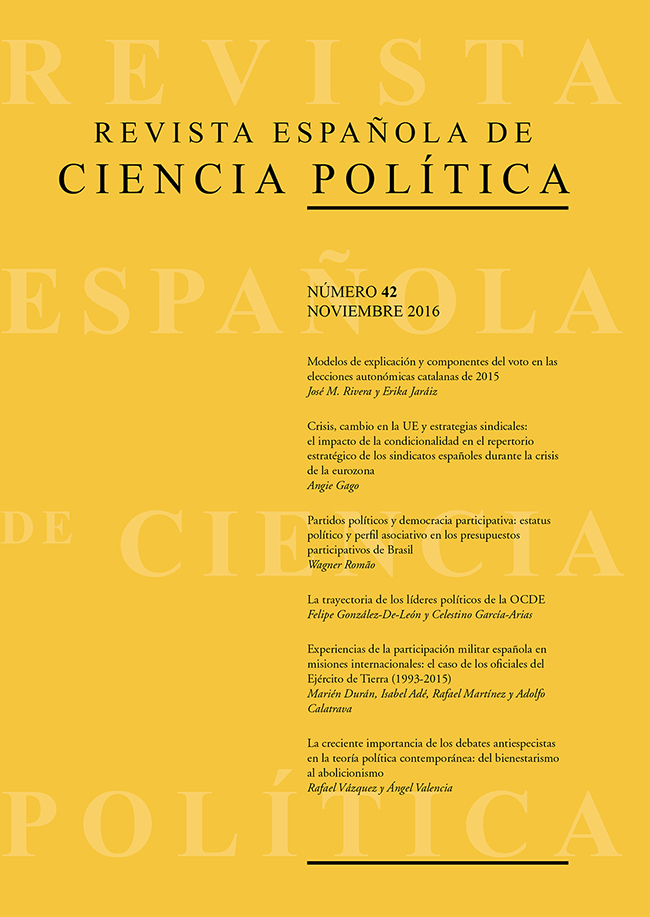La trayectoria de los líderes políticos de la OCDE
DOI:
https://doi.org/10.21308/recp.42.04Palabras clave:
Líderes, bases de datos, élites políticas, tecnócratas, partidos políticos, educación.Resumen
Esta nota de investigación tiene por objeto de estudio a los jefes de Estado y/o de Gobierno de 33 países de la OCDE para un período que va desde el año 1990 hasta el año 2012. Así, en primer lugar, presentamos una nueva base de datos, «Líderes Políticos de las Democracias Contemporáneas» (LPDC), en la cual se recoge información sobre diversas características de dichos líderes como su género, edad, nivel educativo, tipo de formación, militancia política, duración en el cargo, trayectoria política y trayectoria profesional previa. En segundo lugar, se presentan los resultados de un análisis descriptivo que permite elaborar un perfil de los líderes examinados.
Descargas
Citas
Adolph, Christopher. 2013. Bankers, Bureaucrats, and Central Bank Politics: The Myth of Neutrality. New York NY: Cambridge University Press. Disponible en: http://dx.doi.org/10.1017/CBO9781139506762.
Arezki, Rabah, Herbert Lui, Marc Quintyn y Frederik Toscani. 2012. «Education Attainment in Public Administrations around the World: Evidence from a New Dataset», International Monetary Fund Working Paper, WP/12/231. Barcelona Center for International Affairs (CIDOB). Biografías de Líderes Políticos. Barcelona. Disponible en web: http://www.cidob.org/biografias_lideres_politicos.
Besley, Timothy, Rohini Pande y Vijayendra Rao. 2005. «Political Selection and the Quality of Government: Evidence from South India», CEPR Discussion Paper, 5201.
Besley, Timothy, José G. Montalvo y Marta Reynal-Querol. 2011. «Do Educated Leaders Matter?», The Economic Journal, 121 (554): 205-227. Disponible en: http://dx.doi.org/10.1111/j.1468-0297.2011.02448.x.
Besley, Timothy y Marta Reynal-Querol. 2011. «Do Democracies Select More Educated Leaders?», American Political Science Review, 105 (3): 552-566. Disponible en: http://dx.doi.org/10.1017/S0003055411000281.
Borchert, Jens y Klaus Stolz. 2011. «Introduction: Political Careers in Multi-level Systems», Regional and Federal Studies, 21 (2): 107-115. Disponible en: http://dx.doi.org/10.1080/13597566.2011.529757.
Botella, Joan, Juan Rodríguez Teruel, Oscar, Barberà y Astrid Barrio. 2011. «Las carreras políticas de los jefes de gobierno regionales en España, Francia y el Reino Unido (1980-2010)», Revista Española de Investigaciones Sociológicas, 133: 3-20. Disponible en: http://dx.doi.org/10.5477/cis/reis.133.3.
Blondel, Jean. 1985. Government ministers in the contemporary World. Londres: Sage Coller, Xavier. 2008. «El sesgo social de las élites políticas. El caso de la España de las autonomías», Revista de Estudios Políticos, 141: 135-159.
Coller, Xavier, Andrés Santana y Antonio M. Jaime Castillo. 2014. «Problemas y soluciones para la construcción de bases de datos de políticos», Revista Española de Ciencia Política, 34: 169-198.
Constant, Amelie F. y Bienvenue N. Tien. 2010. «African Leaders: Their Education Abroad and FDI Flows», IZA Discussion Paper Series, 5353.
Dahl, Robert A. 1961. Who governs? Democracy and Power in an American City. New Haven: Yale University Press.
Dee, Thomas S. 2004. «Are there civic returns to education?», Journal of Public Economics, 88 (9-10): 1697-720. Disponible en: http://dx.doi.org/10.1016/j.jpubeco.2003.11.002.
Dreher, Axel, Michael Lamla, Sarah Lein y Frank Somogyi. 2009. «The impact of political leaders’ profession and education on reform», Journal of Comparative Economics, 37: 169-93. Disponible en: http://dx.doi.org/10.1016/j.jce.2008.08.005.
Elgie, Robert (ed.). (1999). Semi-presidentalism in Europe. Oxford: Oxford University Press. Disponible en: http://dx.doi.org/10.1093/0198293860.001.0001.
Ellis, Cali M., Michael C. Horowitz y Allan C. Stam. 2015. «Introducing the LEAD Dataset», International Interactions, 41 (4): 718-741. Disponible en: http://dx.doi.org/10.1080/03050629.2015.1016157.
Flores, Thomas, Gabriella Lloyd e Irfan Nooruddin. 2013. «The Technocratic Advantage? Leadership and IMF programs», Working paper.
Galasso, Vincenzo y Tommaso Nannicini. 2011. «Competing on Good Politicians», American Political Science Review, 105 (1): 79-99. Disponible en: http://dx.doi.org/10.1017/S0003055410000535.
Genieys, William. 2011. Sociologie politique des élites. Paris: Armand Colin. Disponible
en: http://dx.doi.org/10.3917/arco.genie.2011.01.
Gerring, John, Erzen Oncel y Kevin Morrison. 2014. «The Global Leadership Project: A Comprehensive Database of Political Elites». Unpublished paper, Department of Political Science, Boston University.
Goemans, Henk E., Kristian S. Gleditsch y Giacomo Chiozza. 2009. «Introducing Archigos: A Dataset of Political Leaders», Journal of Peace Research, 46 (2): 269-283. Disponible en: http://dx.doi.org/10.1177/0022343308100719.
Göhlmann, Silja y Roland Vaubel. 2007. «The educational and occupational background of central bankers and its effect on inflation: an empirical analysis», European Economic Review, 51: 925–41. Disponible en: http://dx.doi.org/10.1016/j.euroecorev.2006.05.001.
Guttsman, Wilhelm. 1963. The British political elite. Nueva York: Basic Books.
Hallerberg, Mark y Joachim Wehner. 2012. «The Educational Competence of Economic Policymakers in the EU», Global Policy, 3 (1): 9-15. Disponible en: http://dx.doi.org/10.1111/1758-5899.12006.
Jones, Benjamin y Benjamin Olken. 2005. «Do leaders matter? National leadership and growth since World War II», The Quarterly Journal of Economics, 120 (3): 835-64. Disponible en:
http://dx.doi.org/10.1093/qje/120.3.835.
Lentz, Harris M. 1994. Heads of States and Governments: A Worldwide Encyclopedia of Over 2,300 Leaders, 1945 through 1992. Jefferson, NC: McFarland.
McDonnell, Duncan y Marco Valbruzzi. 2014. «Defining and classifying technocrat-led and technocratic governments», European Journal of Political Research, 53 (4): 654-671. Disponible en: http://dx.doi.org/10.1111/1475-6765.12054.
Milligan, Kevin, Enrico Moretti y Philip Oreopoulos. 2004. «Does Education Improve Citizenship? Evidence from the United States and the United Kingdom», Journal of Public Economics, 88( 9-10): 1667–1695. Disponible en: http://dx.doi.org/10.1016/j.jpubeco.2003.10.005.
Putnam, Robert D. 1976. The Comparative Study of Political Elites. Englewood Cliffs: Prentice-Hall.
Rodríguez Teruel, Juan. 2011. Los ministros de la España democrática. Reclutamiento político y carrera ministerial de Suárez a Zapatero. Madrid: Centro de Estudios Políticos y Constitucionales.
Sartori, Giovanni. 1992. Ingeniería constitucional comparada. México DF: Fondo Cultura Económica.
Sleeman, Elizabeth y Richard Fitzwilliams (eds.). 2004. The International Who’s Who. Londres: Europa Publications Limited.
Sonntag, Lars. 2010. Politica. Disponible en web: www.kolumbus.fi/taglarsson/
Descargas
Archivos adicionales
Publicado
Cómo citar
Número
Sección
Licencia
Derechos de autor 2016 Felipe Alfonso González De León, Celestino García Arias

Esta obra está bajo una licencia internacional Creative Commons Atribución-NoComercial-SinDerivadas 4.0.






